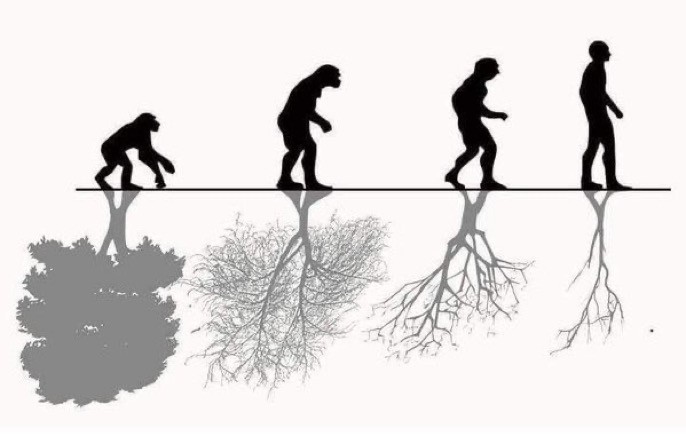
The Evolutionary Implications of Technological Advancements: Are Humans Evolving or Devolving?
Technology, all around us, continues to advance at an unprecedented pace - which is good for human comfort and many other aspects of human wellbeing. But I also see it raising profound questions on the trajectory of human evolution. While it has undeniably transformed our lives to a great extent, we need to ponder on whether these advancements contribute to the evolution of human species or the devolution.
Let's talk about it! :)
- The Evolutionary Perspective

Evolution, as a biological process, typically occurs over long periods, shaped by natural selection and genetic variations (so to say, atleast). From an evolutionary perspective, humans are the peak of evolution, considering that no other creature has been bestowed with so many capabilities. No doubt, humans have undergone significant changes throughout history, adapting to various environments and challenges, the development of complex cognitive abilities, language, and culture has propelled human progress in many ways.
Technological advancements can be seen as extensions of our evolutionary capacities. Tools, from simple stone implements to sophisticated artificial intelligence, have augmented human capabilities and transformed societies. With each new technology, humans have gained the ability to overcome limitations and explore uncharted territories. Technology, so to say, has put humans on fast forward mode in terms of external evolution.
- The Cognitive Shift

One notable aspect of technological advancements is the impact on human cognition. The availability of vast amounts of information at our fingertips and the ubiquity of digital devices have altered the way we think, learn, and process information. Some argue that these changes represent a cognitive evolution, as we adapt to new modes of communication and problem-solving.
However, others express concern that these changes may lead to a devolution of human cognition. The reliance on technology for basic functions, such as memory recall or critical thinking, could diminish our cognitive capacities over time. Furthermore, the potential for information overload and constant distractions may hinder deep intellectual engagement and contemplation.
- Physical Adaptations in the Technological Age

Evolutionary processes often involve physical adaptations to better suit environmental demands. While modern technology has made our lives more comfortable and convenient, it has also introduced sedentary lifestyles and reduced physical exertion. The decrease in physical activity may lead to health issues such as obesity, cardiovascular diseases, and musculoskeletal disorders.
However, the rise of fitness technology and the increasing focus on health and well-being might counterbalance these negative effects. Thus, it can be argued that humans are actively shaping their physical evolution by utilizing technology to maintain a healthier lifestyle to some extent, but as with anything else, it does take a constant striving. What I wonder about is that just to stay normally fit, we have developed so many lalley-pabbey (slang for unnecessary accumulations).
- Socio-cultural Evolution

In addition to biological and cognitive changes, technological advancements have significantly influenced socio-cultural evolution. The advent of agriculture, the Industrial Revolution, and the digital age have transformed the structure of societies and the way we interact.
Global connectivity and social media have revolutionized communication, enabling unprecedented levels of interconnectedness. This interconnectedness has brought diverse cultures and perspectives together, fostering innovation, empathy, and understanding. However, it has also led to challenges such as information manipulation, social polarization, and the erosion of privacy.
- The Ethical Dimension

When considering the impact of technological advancements on human evolution, ethical considerations come to the forefront. As we develop powerful technologies such as genetic engineering, artificial intelligence, and robotics, we face ethical dilemmas concerning the limits of intervention and the potential consequences of altering the course of evolution.
It is crucial for society to engage in thoughtful dialogue and establish ethical frameworks that guide technological development in a manner that aligns with our shared values. Responsible innovation and a comprehensive understanding of the potential risks and benefits are essential for ensuring that technological advancements contribute positively to human evolution.
Verdict:
The question of whether humans are evolving or devolving in the face of technological advancements does not have a straightforward answer. Technological progress undoubtedly impacts our biological, cognitive, and socio-cultural dimensions. It is up to us as individual life-forms to navigate these changes consciously, ensuring that our humanity guides the trajectory of our evolution.
Ultimately, the advancements in technology provide us with unprecedented opportunities to shape our own evolution consciously. By harnessing the potential of technology while remaining vigilant about its implications, we can steer human evolution towards a future that combines the best of our biological heritage with the transformative power of innovation.
Thank you and have a 'conscious' time ahead!
Product Strategy | Digital Supply Chain ( Operate) | SaaS - B2B
9moGood one